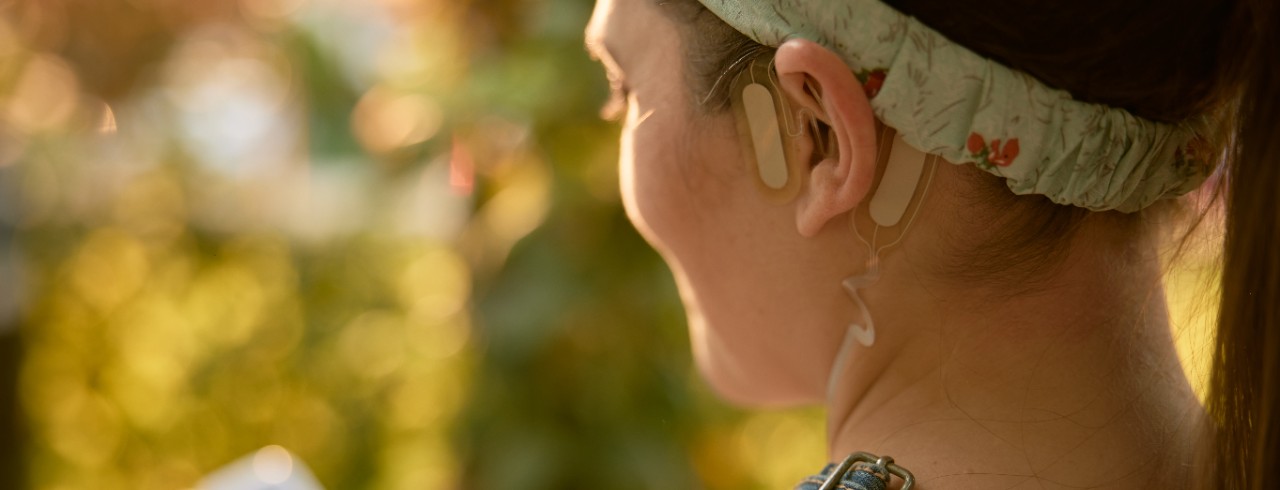
Cape Girardeau, Missouri news highlights UC clinical trial
Study to test neurostimulation to treat opioid withdrawal, PTSD
KFVS-TV in Cape Girardeau, Missouri highlighted a University of Cincinnati clinical trial testing a wearable neurostimulation device to help patients with opioid use disorder (OUD) and post-traumatic stress disorder (PTSD) stick with medication treatment while finding the right dose.
UC's Joel Sprunger, principal investigator of the trial, said the medication buprenorphine is an effective treatment to help patients with OUD manage symptoms of opioid use disorder withdrawal, but there is an adjustment period of up to three months as each patient finds the right dose to manage their symptoms.
In response to this challenge, the trial will utilize the Sparrow Ascent – a patient-administered wearable device that delivers mild electrical stimulation to the cranial branches of the vagus and trigeminal nerves on and around the ear.
Sprunger said the stimulation “pumps the brakes” on the sympathetic nervous system by enhancing parasympathetic activity, helping to transition someone from fight-or-flight to “rest and digest.”
“By providing people control over that stimulation, we can empower them with a way to turn it on when needed and feel some relief,” said Sprunger, assistant professor of psychiatry and behavioral neuroscience in UC’s College of Medicine. “Their heart rate slows down, breathing slows down and there’s a lot less of a sense of panic and urgency. So that’s the key ingredient that we think will hit both PTSD and opioid withdrawal symptoms at the same time.”
The trial is enrolling patients at the Gibson Center for Behavioral Change in Cape Girardeau.
“It does give the patient some ownership and some control over their treatment,” Ryan Essex, Gibson Center chief operating officer, told KFVS. "We get to bring cutting edge treatment options to populations who are kind of our most vulnerable and don’t get access to those."
NeuroNews also highlighted the trial. Read the NeuroNews story.
Featured photo at top of woman wearing the Sparrow Ascent device. Photo/Spark Biomedical.
Related Stories
President picks exceptional talent
April 28, 2021
The University of Cincinnati 2021 Presidential Leadership Medal of Excellence Awards honor six undergraduate scholars for scholarship, leadership, character, service and the ideals of the university. Awardees are spotlighted for exceptional academics, creativity, community service and innovation.
Grad students earn president's highest honor
April 28, 2021
The University of Cincinnati 2021 Presidential Medal of Graduate Student Excellence Awards honor three graduate scholars for scholarship, leadership, character, service and the ideals of the university. Awardees are spotlighted for exceptional academics, creativity, community service and innovation.
GIVEHOPE and BSI Engineering Celebrate Ten Years of Driving Research
August 3, 2021
Years after two personal losses from pancreatic cancer, Cincinnati-based nonprofit GIVEHOPE and consulting firm BSI Engineering are celebrating a philanthropic partnership that has funded 13 pilot research projects at the University of Cincinnati Cancer Center.
Finding community and building a future
July 9, 2021
As a University of Cincinnati College of Medicine student, Sarah Appeadu, MD, ’21, remembers journaling on the “3 Cs” that got her through medical school: Community, community, community. Now, when she lists the people who supported her through four years of training—the last year in a global pandemic—it keeps growing: her family, her church, her classmates, and the college’s Office of Student Affairs and Office of Diversity, Equity and Inclusion. “I look back and it was such a crucial time to really be nurtured in that way,” she says. “I’m so thankful that I had those people. It shows being around the right people really mattered. That’s my same hope for residency even.”
UC to honor 2,079 grads at summer Commencement
August 2, 2021
UC celebrates the 2021 summer Commencement on Friday in two ceremonies at Fifth Third Arena. On Saturday, UC will recognize 2020 grads with an in-person Commencement celebration.
New York Times: Flint Weighs Scope of Harm to Children Caused by Lead in Water
February 1, 2016
Kim Dietrich, a professor of environmental health at UC's College of Medicine, is quoted in this story on the medical problems that could develop among the thousands of young children exposed to lead-contaminated water in Flint, Mich.
Cancer-Causing Gene Found in Plasma May Help Predict Outcomes for Patients
February 18, 2016
Researchers at the University of Cincinnati have discovered that a human cancer-causing gene, called DEK, can be detected in the plasma of head and neck cancer patients.
UC Receives $1.9 Million to Study Pain
February 15, 2016
Jun-Ming Zhang, MD, of the UC College of Medicine, is the principal investigator of a $1.95 million grant to study the interacting roles of the sympathetic and sensory nervous and immune systems in back and neuropathic pain models.
MD Magazine: Generic Drug Equally Effective in Epilespy
February 22, 2016
Michael Privitera, MD, a professor of neurology at UC's College of Medicine and director of the Epilepsy Center at the UC Neuroscience Institute, is featured in this story about research he led that examined the efficacy of generic drug substitution for epilepsy.
UC to Host Regional Conference for Latino Medical Student Association
February 10, 2016
The University of Cincinnati chapter of the Latino Medical Student Association (LMSA) will host a Midwest regional conference Feb. 26-28, 2016, at the College of Medicine.
